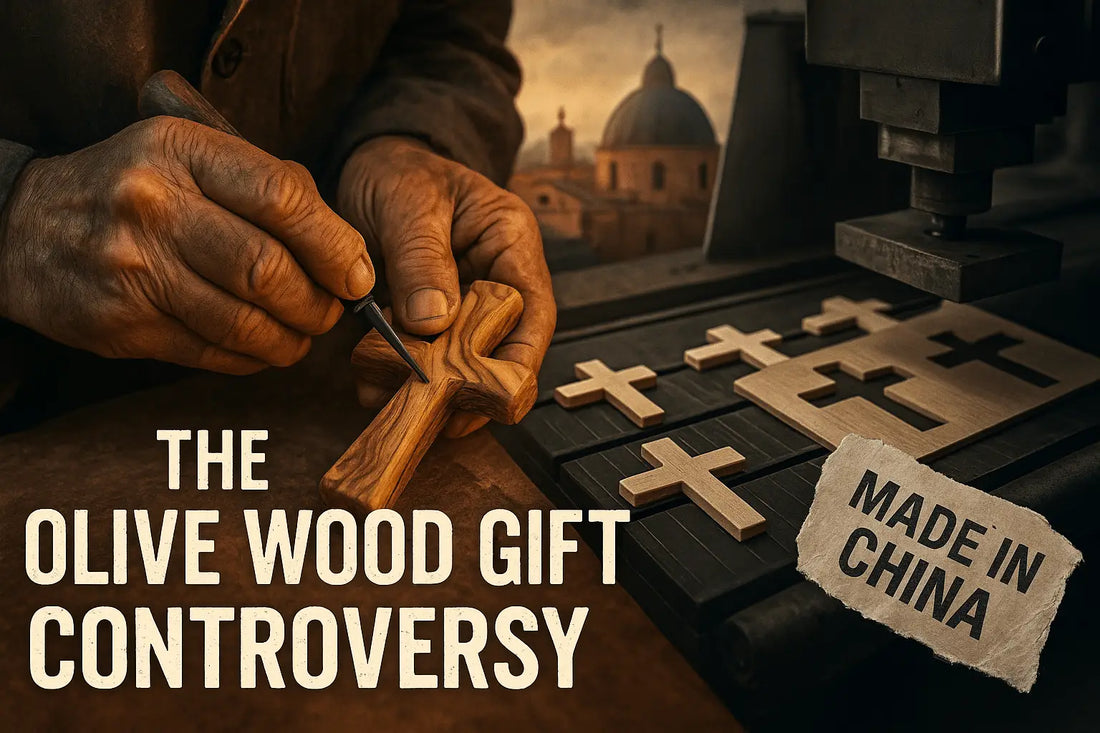Exposing the Olive Wood Gift Industry: Fake Faith, Real Consequences, and the Fight to Save Bethlehem’s Christian Artisans

The Olive Wood Gift Controversy: What You're Not Being Told
Walk into any Christian store or Holy Land market, and you’ll see them : shelves lined with olive wood crosses, rosaries, nativity sets, and beautifully carved figurines . They look sacred. They feel sacred . But here’s the thing most people have no idea where they really come from .
This isn’t just a story about olive wood gifts . It’s a wake-up call .
1. Faith or Factory? When Your Cross Comes from a Machine
Let’s not sugarcoat it: many so-called "olive wood religious gifts" are made thousands of miles away from the Holy Land in factories, not family workshops. I know, it sounds crazy. But it's true .
I've seen them with my own eyes packages arriving in bulk, stamped “Made in China,” yet marketed with images of Bethlehem in the background .
So that olive wood rosary you bought? Or the cross you proudly display at home? Unless you dug a little deeper, it might not be as holy as you thought .
It’s not just about geography . It’s about honesty, heritage, and who really benefits . Because when something sacred becomes just another SKU, the soul gets stripped out of it .
2. The Bethlehem Carver You’ve Never Heard Of

I once stood in a tiny olive wood workshop tucked behind Manger Square . The scent of fresh wood lingered in the air . An old man hands calloused, eyes soft carved a nativity figure with quiet devotion .
His family had been doing this for generations .
But business? Nearly gone .
Why? Because tourists walk two blocks over and buy a "nativity set" imported in bulk . Cheaper, shinier, and completely soulless .
Real olive wood carvings, Christmas ornaments, and handmade olive wood items take hours sometimes days to make . They're not pumped out by machines . They come with stories, scars, blessings .
That old man in Bethlehem? He doesn’t just sell carvings . He sells memories . He sells faith .
3. Holy Wood or Hollow Hype? What the Label Doesn’t Say
"Christian Gift, Handcrafted, Made with love ."
Nice words . But they don’t always mean what you think .
Some online stores slap those terms on everything from olive wood crosses to kitchen spoons. And a lot of it? Machine mad e. Mass-produced . No connection to the Holy Land at all .
Here’s a dirty secret: Some companies fake olive wood grain. Others chemically treat pine or acacia to look like olive wood. I’ve even seen composite resin pieces passed off as handmade religious art.
So next time someone says "this olive wood religious gift is from Bethlehem," ask them: Who made it? What’s their name?
If they can’t answer that… well, maybe it’s not so holy after all.
4. The Surprising Truth About Olive Wood Kitchen Utensils
Now here’s something that might surprise you.
Of all the olive wood gifts out there, the most ethical one might not be that rosary or cross. It might be a spoon.
Yes, really .
Many olive wood kitchen utensils like ladles, salad servers, even cutting boards are made by local artisans using leftover wood from religious carvings . They're practical, sustainable, and often hand finished by the same families who make nativity sets .
Unlike fake souvenirs, they don’t pretend to be anything more than they are . Yet they often support artisans better, because they sell year round not just to tourists.
So maybe the path to conscious shopping starts in the kitchen, not the chapel.
5. What Are You Really Buying? The Ethics Behind Christian Branding
Let’s ask the uncomfortable question: When you buy a Christian gift, are you buying faith… or just buying cheap?
A product doesn’t become Christian just because it has a cross on it . And yet, many large companies rely on that illusion . They mass produce items, mark them with symbols, and ship them globally never once mentioning where, or how, or by whom they were made .
But here’s what you should know:
-
Many olive wood rosaries are made by non-Christian workers
-
Some nativity sets are assembled in warehouses, not homes
-
Plenty of "handmade" items are stamped out by machines
And while that might be legal—it doesn’t sit right, does it?
Real handmade olive wood items aren’t just wood and polish. They’re culture. They’re prayer. They’re resistance.
When you support Zuluf, you’re not funding a faceless supply chain. You’re supporting Christian families who carve history into every piece.
Spotting the Fakes: A Quick Buyer’s Checklist
Want to shop smart? Here’s how:
-
✅ Look for photos of real artisans or workshops
-
✅ Ask where the olive wood was sourced and carved
-
✅ Check if the shop is located in Bethlehem or connected to it
-
✅ Be skeptical of anything “too perfect” or underpriced
And most importantly, trust your gut . If something feels too commercial, too polished, too impersonal it probably is .
Final Words: Sacred Doesn’t Mean Shiny
A true olive wood cross doesn’t need gold trim. A nativity set doesn’t need LEDs . A rosary doesn’t need a velvet box to be powerful .
What it needs is heart .
The hands that carved it. The village it came from. The quiet prayers that shaped it .
You can still find that heart—but only if you know where to look .
So next time you're browsing olive wood gifts, remember: you’re not just buying a product. You’re choosing a story. Make sure it’s one worth telling.
👉 Shop consciously. Shop Bethlehem. Shop Zuluf.com.












